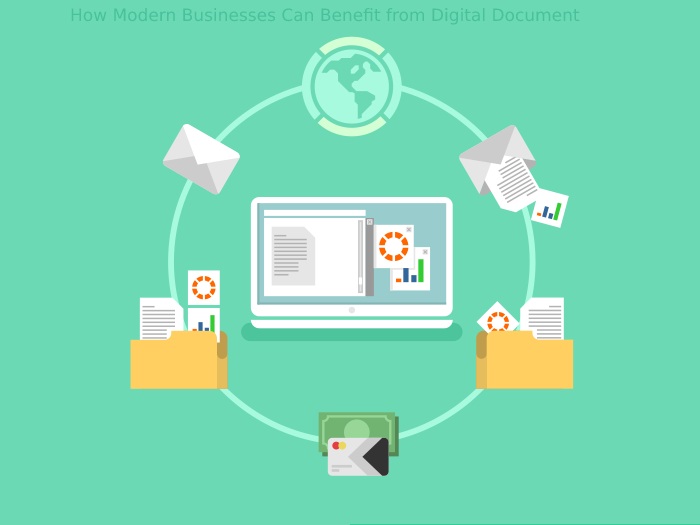How Modern Businesses Can Benefit from Digital Document Systems

How Modern Businesses Can Benefit from Digital Document Systems
The majority of firms are switching from paper to digital document at this time. However, many firms, such as regular government administration, continue to rely on paper for crucial needs.
Going paperless has benefited many firms, particularly those in the healthcare, technical, and financial industries. However, for some, the changes may be difficult.
Best practices and strategic planning that can aid your company’s growth should be put into practice immediately. The advantages of implementing a digital management system for your organization will be covered in this article.
Table of Contents
Digital Document System: What Is It?
A digital document system is a program used to record, save, manage, and easily retrieve data. It is frequently used to refer to an overarching plan for how a company gathers, evaluates, and documents pertinent records.
A digital document system’s functionality would be required, including multi-user access, version control, auditing, metadata, advanced search, and even simple user collaboration tools.
Some of these solutions enable the accessible collection of documents through automated data capture, which may aid your team in swiftly retrieving any document.
What is the Process of a Digital Document System?
A digital document system can achieve more than just converting paper documents to digital data. Additionally, it automates tasks involving paper.
Take down documents
The process of digitization is one way to manage digital documents. Paper documents should be scanned before being collected. Advanced technologies like optical character recognition (OCR) are required to extract the data from these pages, complete the metadata, and save this data in the system.
One optical character recognition (OCR) program that can convert documentation quickly, easily, and accurately is called Omnipage Standard.
Organizations may utilize document and barcode scanners, smart card readers, and signature capture pads to gather all the information required to make better-informed decisions.
Process and Workflow Optimisation
A digital document system also makes it possible to automate operations and processes. For example, invoices can be automatically forwarded to an accounts payable system. The user may be informed if the system discovers a problem. The bill is then promptly paid.
Integrating your digital document management system with your effective resource planning system (ERP) is another efficient method for automating operations. An order might start a work cycle in your digital document system once it is created in your ERP. Thanks to this workflow, the order will be immediately routed through authorization and closer integration.
Storage of Documents
One of the key functions of a content management system is the safe storage of digital documents and the ability to preserve or remove them. Employees can easily and quickly access the digital information of your company when it is kept in a single, central location, and authorization settings typically keep up security.
On-premises and Cloud-based Hosting
Systems for managing digital documents are available both locally and in the cloud. On-premises software licenses should be installed on the network and the files used by employees. Additionally, maintaining current software versions is entirely your responsibility; some software vendors may charge a fee for updates.
In addition to the software, you’ll need gear for data processing and storage and money to power the equipment. If additional security is necessary for compliance, you are also responsible for providing it.
Additionally, the vendor of the system sets up and maintains cloud systems. Hardware or maintenance costs won’t be your responsibility. Additionally, compliance has built-in security safeguards. You add or decrease your services as needed and pay a regular fee.
Customer Reviews
An essential component of producing better products is listening to your customers. You risk losing the customer feedback form if you rely solely on a manual document. A digital document system, however, can store customer comments for a very long time.
With the assistance of company analytics offered by modern digital document systems, you can raise the caliber of your offerings.
Digital Document System Advantages
In contrast to replacing paper files with digital ones, digital document management fundamentally allows businesses to alter their data storage strategy. The user has numerous advantages that enhance working circumstances in various industries.
Security
One of the main issues for the firm will always be protecting its records. Fortunately, this method may be greatly improved by employing a digital document management system.
As we’ve already stated, the data will never be lost intentionally or unintentionally because only those who require it can access it. Detailed information is available regarding who has access to what and when. If any obstacles need to be overcome, a path that can be followed is left behind.
Security issues may arise if you communicate sensitive information over unencrypted email. A Word or PDF attachment to an email containing client information risks being seen by someone you don’t want to see. These specifics might be used to trick people into paying cash to criminal organizations.
Easy and quick access
Access to relevant information must be quick, easy, and effective while working with paperwork or data. The ability to look for and retrieve data is greatly improved by digital document management.
Desktop computers may be used to conduct searches, eliminating the need to travel and sort the paperwork.
At the company level, very specialized file systems can be created, enabling users to concentrate frequently on their required knowledge.
Similarly, access to specific types of data can be restricted based on needs, provided all employees can discover the information they need without risking wandering off course.
Remote document access makes it possible to work outside the office and eliminates the need to transmit data physically.
Conserves space
Providing the space needed to store massive paper-based documents took work. Smaller firms can operate in constrained environments, but larger businesses may become overburdened by the volume of data they must maintain.
As a result of the fact that many businesses operate from multiple sites and locations, transportation challenges could arise. A digital document management system ensures that space is used effectively and may reduce the cost of renting space.
A business’s location can be more desirable to customers, free of paperwork and supporting documentation. It can highlight its dedication to environmental conservation with a focused effort to eliminate the trash.
Improved Compliance
The benefit in this situation is minimizing issues that might be significant enough to halt operations. Government regulations require the retention of a wide variety of data and records, and the standards are frequently intricate.
An efficient digital document management system maintains compliance by incorporating features like logins, standard forms, and checklists.
Improved Workflows
You must move papers between internal and external partners, departments, and individuals within the same department for the project to be successful. People performing various duties will frequently be required to look at the document during the process.
When transferring documents, a digital system can do so swiftly, effectively, and with much less chance of human error.
Saving money
The expense of managing the enormous amount of documentation produced is a significant drain on company resources. When adopting a paper-based system, costs quickly increase due to the required quantity of paper, ink, file folders, storage cabinets, and file workers. Additionally, efficiency gains might lead to significant cost savings.
enhances the management of consumer relationships
By 2025, it’s anticipated that millennials will account for half of the workforce. Therefore, it’s imperative to satisfy their wants. Although millennials tend to be impatient, they value thorough information about what they buy.
A digital document management system, which enables more effective and fast client interaction, can improve customer satisfaction and loyalty.
increases efficiency and productivity
Your company’s productivity and efficiency may benefit significantly from digitizing your paper records in several ways. Faster response times brought on by digital documents during customer interactions may result in a more positive overall experience for the customer.
Additionally, they facilitate collaboration and are much easier to find, organize, and search for, which could help you save time and enhance company operations.
Final Remarks
Turning digitally is a terrific place to start, and a good strategy includes understanding how digital document management works. The ideal strategy streamlines manual tasks as well as workflows.
Adopt digital documents and take the appropriate actions to reap the rewards of a smooth digital operation.
Also read:-The Benefits of Digital Faxing for Your Cybersecurity Plan




